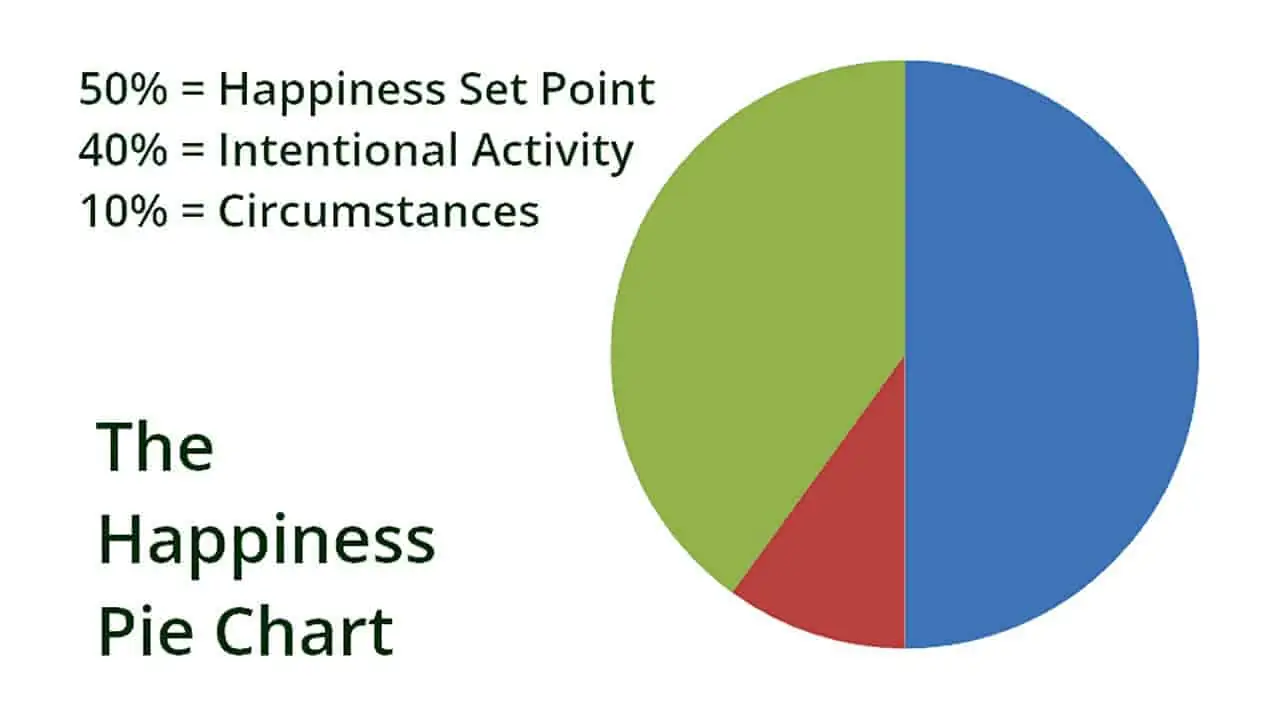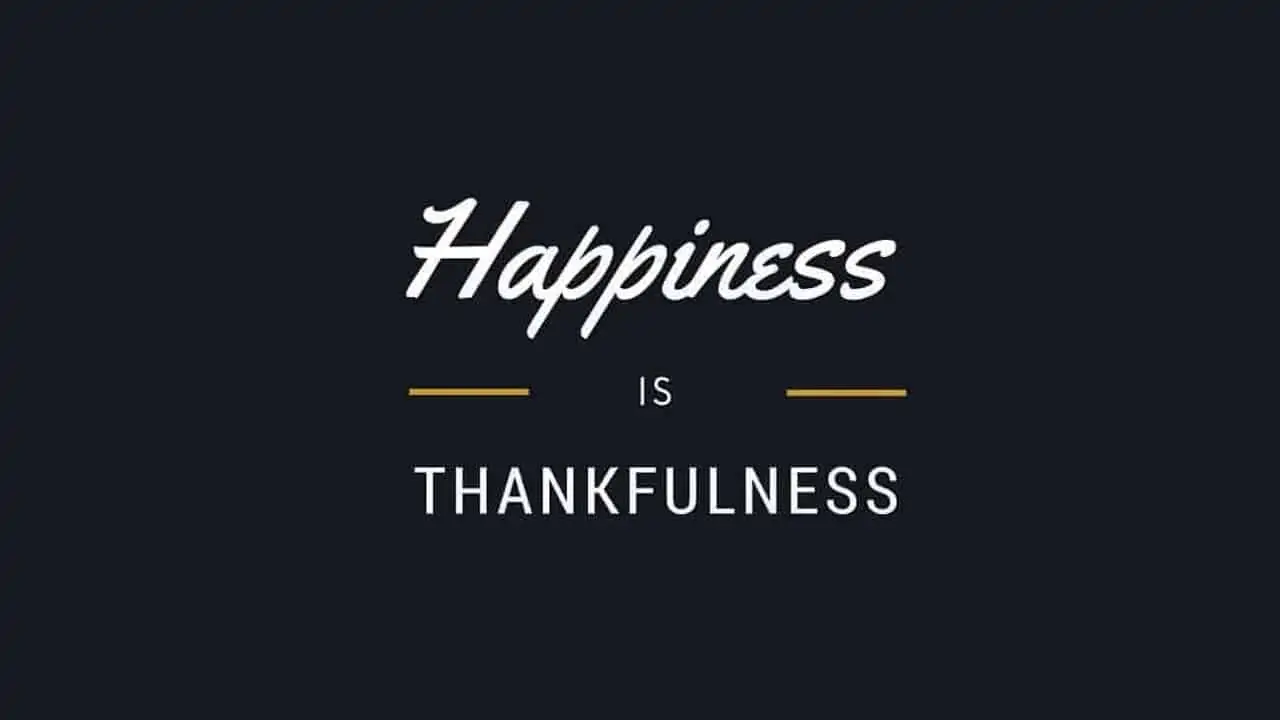Can gratitude increase happiness?
According to Martin Seligman (2004), since only about 50% of happiness is genetic, people can be taught to be happy. And being grateful is the key to happiness.
Practicing thankfulness is perhaps the easiest happiness activity. You can be happier by simply being thankful for waking up to a new day.
Gratitude is appreciating the good things in your life and thanking the people who made those things possible.
Table of Contents
Gratitude Is The Key To Happiness
Gratefulness is the key to a happy life.
Gratitude and happiness are linked, as many studies in positive psychology show.
It boosts positive emotions and savoring, improves health, builds resilience, and fosters strong connections. It can bring both immediate happiness and long-lasting joy through memories.
Expressing gratitude for the things you have and the things you receive makes you happier. Practicing gratefulness is the easiest key to enhancing your happiness in your daily life. But why do we say so?
Look at the equation below:

What does it say about your life until today?
- Happiness is more thankfulness: The more the number of things or experiences you have in your life to be thankful for, the bigger the upper figure in that equation, and the happier you are.
- Happiness is less resentfulness: And, the more the number of resentments and regrets in your life, the bigger the denominator, and the lesser your consequent happiness.
You’ll be disappointed if you keep wishing for things you don’t have, hoping they’ll make you happy.
Those things, once acquired or achieved, can reward you at best with a few moments of joy because of a phenomenon called arrival fallacy.
External rewards can’t bring you lasting happiness.
Why? Because happiness comes more from our actions than our circumstances.
See the pie chart of the happiness formula; it says about 40% of happiness comes from the intentional actions (called happiness interventions) we take.

You can increase your happiness by taking the action of expressing your gratitude. Thus, gratitude is the key to happiness.
“Practicing gratitude and generosity are important for all who seek true happiness. In fact, teaching children to show gratitude enhances learning and reduces the prevalence of mental health problems such as depression.” – Birnbaum & Friedman, 2014
Gratitude or gratefulness, a word that comes from the Latin word gratus, is a feeling of thankfulness and appreciation for what one receives. With gratitude, one acknowledges the goodness that people have in their lives.
Robert Emmons, one of the best-known researchers on gratitude and author of Gratitude Works!: A 21-Day Program for Creating Emotional Prosperity, defines gratitude as “a felt sense of wonder, thankfulness, and appreciation for life.”
Indeed, it is the most readily available key to unlocking your life’s happiness.

How Does Gratitude Make You Happier?
Why does gratitude enhance your well-being?
Gratitude has been consistently linked to higher levels of happiness.
That is, people with greater gratitude feel more positive emotions. The more grateful people also handle adversities with more optimism and resilience, build more meaningful relationships, and know how to savor good experiences.
So, if there is a link between gratefulness and happiness, how does gratitude make you happier?
- When you’re thankful, you take maximum note of the gifts of life. You take immense pleasure in their presence in your life.
- Gratefulness also indirectly appreciates your accomplishments—the things you’re thankful for, are the very things you’ve achieved in your life.
- Thankfulness also breeds generosity in us, as was found in a study. The study pointed out that people who were thankful to their benefactor were generous towards strangers as well.
- Gratefulness practiced regularly has been shown to reduce overall emotions of negativity, such as anger and jealousy.
- Several studies have shown that even ‘unexpressed’ thankfulness has benefits—grateful people have a stronger bond with those they feel grateful to.
What Does Gratitude Matter?
Why is gratitude important in life?
Gratitude is powerful and essential in our life because it not only makes us feel good but also improves our well-being in a variety of ways, as science has shown.
Gratitude allows you to have more positive emotions, savor the good life experiences more fully, improve your physical and mental health, cope better with adversity and bounce back sooner, and build lasting relationships.
Gratitude Improves Well-Being
Grateful people have higher levels of positive emotions, life satisfaction, vitality, and optimism. And lower levels of depression and stress.
Researchers at the University of Montana found those who expressed more gratefulness reported higher levels of happiness.
According to a Kent State University study, the more the participants showed their gratitude (by consciously thinking about and writing what they valued), the more likely they were to report happy emotions.
Grateful people also do not refuse or ignore the presence of the negative aspects of their life. They, rather, know how embracing their negative emotions can increase their hopefulness.
Gratitude Enhances Prosociality
People who strongly favor gratitude are more empathic when considering the viewpoints of others.
People see grateful people as more generous and more helpful to others within their social networks (McCullough, Emmons, & Tsang, 2002).
Researchers at the University of New South Wales discovered that when people heard someone express thanks, they were more likely to believe they could build a meaningful relationship with the person.
Studies have looked into how thankfulness might improve personal relationships.
A study of couples revealed that people who took the time to express gratitude to their partner felt not just more positive toward the other person, but also more comfortable discussing relationship issues.
Gratitude Helps To Work Harder
Managers who care to say “thank you” to their employees may notice that those employees are more inspired to work harder (Adam Grant & Francesca Gino, 2010).
Researchers at the Wharton School randomly gathered fund-raisers for the University of Pennsylvania and divided them into two groups.
One group made the same phone calls they always did to request alumni donations.
The other group, assigned to work on a separate day, received a pep talk from the director of annual giving, who expressed gratitude to the fund-raisers for their efforts.
Those fund-raisers who heard her message of thanks made 50% more fund-raising calls the following week than those who did not.

Gratitude Is Linked To Spirituality
Those people who regularly attend religious services and engage in religious activities, like prayer, are more likely to be grateful.
Grateful people are more likely to admit a belief in the interconnectedness of all life. They also tend to be more committed to and responsible for others (McCullough & Emmons, 2002).
Though gratitude does not require one to have religious faith, faith enlarges one’s ability to be grateful.
Gratitude Reduces Materialism
Grateful people put less importance on material goods. They are less likely to judge their own and others’ successes in terms of material possessions.
They feel less envy towards others. Furthermore, they are also more likely to share their belongings with others as compared to less grateful persons.
Cornell University researchers analyzed 1,200 samples of online feedback and discovered that when people submitted positive ratings about experiences, they were more likely to show happiness—even more than when they submitted reviews about purchases.
Sonja Lyubomirsky, the author of The How of Happiness, says:
The expression of gratitude is a metastrategy for achieving happiness.
How Can You Practice Being Grateful?
Gratitude can be nurtured through practice. Here are a few ways to increase your gratefulness:
- Notice the things you already have in your life and feel thankful for them. Thank the kind people who made those good things exist in your life.
- Take note of the good things in your life rather than taking them for granted. Appreciate them for the comfort and convenience they give.
- You could be grateful for the food on your table, the roof over your head, and the joy of being surrounded by your loved ones.
- You can be thankful for as simple a thing as a bright new morning — thankful that you have the gift of a promising day, a thing that millions of people aren’t promised.
- The Three Good Things is a highly effective exercise to practice gratitude and raise our happiness levels.
- Writing a gratitude journal every day is another helpful way. Expressing gratitude in a journal entry not only makes us savor the joy of the day, but it also makes us happy in the afterglow when we read it later.
What Are Some Gratitude Exercises?
Experts have proven that whatever your current level of gratitude, you can always grow it. So, how to express gratitude more often and make it a habit? Here are a few exercises to grow your gratitude:
- Write a gratitude letter or a thank-you note.
- Thank someone in person, or in your mind.
- Keep a gratitude journal, and fill it in every night.
- Practice the Three Good Things (TGT) happiness exercise.
- Count your blessings whenever you can, every day.
- Try to set a habit of daily mindfulness meditation.
Final Words
A happy person does NOT “smile above all the odds” – like a walking toothpaste ad.
Happiness changes over time. You can be happy with your life and still not be happy all the time.
Let me repeat, gratitude is key to happiness. as has been strongly and persistently shown by positive psychology research.
So, right now, as you finish reading this, choose to feel and express gratitude:
Thank someone for something. If not to them in person, then at least in your mind.
You’ll be happier as a result.
Researched and reviewed by Dr. Sandip Roy — medical doctor, psychology writer, and happiness researcher.
• • •
• • •
√ If you found this useful, please spread the word.